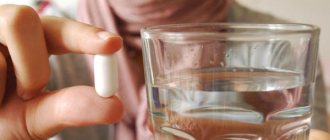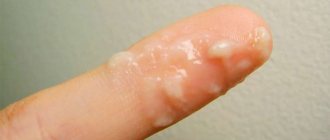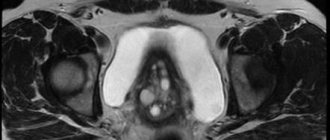Causes of vaginal dryness
Normally, every day a woman produces a small amount of leucorrhoea - the natural lubricant includes intercellular fluid, epithelial cells, lactic acid and mucus, it contains bacteria that maintain the balance of the vaginal microflora.
The process of formation of leucorrhoea is regulated mainly by estrogens; when the level of this hormone decreases, their quantity decreases, as a result - atrophic vaginitis.
Important!
In the absence of regular sexual activity, the risk of vaginal dryness increases - during arousal, the amount of lubrication increases due to the rush of blood to the genitals, during intimacy, epithelial cells actively exfoliate, and glycogen is released, which is required for the growth of beneficial bacteria.
Natural Causes of Vaginal Dryness
The amount of lubrication in women is constantly changing, it all depends on the state of the hormonal level.
When there is little leucorrhoea:
- Before menstruation - after ovulation, the level of estrogen decreases, the amount of progesterone gradually increases until the 21st day of the cycle. Then the woman begins to be bothered by vaginal dryness during sex, after menstruation the discomfort disappears.
- During pregnancy - usually during this period the amount of leucorrhoea increases, since a lot of estrogen is synthesized. The feeling of dryness occurs mainly in the later stages due to problems with blood circulation - the fetus compresses the vessels in the pelvis.
- After childbirth, the hormone prolactin is responsible for lactation; it suppresses estrogen synthesis, lubricant is not released, or there is very little of it.
- Menopause period. A feeling of dryness is one of the first manifestations of menopause, which is associated with a natural decrease in the amount of estrogen and hyaluronic acid.
In women, the labia begin to dry out approximately 5 years before the cessation of menstruation during menopause.
Vaginal dryness as a sign of pathological processes
In addition to natural causes, diseases, medications, and external factors can provoke a decrease in vaginal lubrication. In this case, not only is the inside of the vagina dry, but other unpleasant symptoms also appear - bleeding of the mucous membranes due to cracks and ulcers, severe discomfort during sex, itching, burning in the intimate area.
Long-term use of antibiotics causes vaginitis
Causes of atrophic vaginitis:
- Long-term use of oral contraception , antihistamines, antihypertensive drugs, antibiotics, antidepressants, diuretics, chemotherapy sessions.
- Stressful situations negatively affect hormonal balance, which leads to disruption of the menstrual cycle, decreased sensitivity and libido, and disturbing itching, burning, and dryness of the genitals.
- Sjögren's syndrome is an autoimmune pathology in which dysfunction of various endocrine glands develops, and the amount of leucorrhoea decreases.
- Vaginal candidiasis - with thrush, the balance of the vaginal microflora is disturbed, a white coating appears on the labia with a sour odor, the woman complains of severe and constant itching and irritation. The disease worsens before menstruation.
- Allergy to hygiene and contraceptive products, lubricants.
- Sexual infections, cystitis - against the background of the inflammatory process, the mucous membranes become covered with numerous erosions, the tissues swell, the normal microflora dies, and natural lubrication disappears. Myoma, endometriosis, benign and malignant tumors can cause discomfort.
- Removing the ovaries , or taking medications to block their functions, leads to surgical menopause.
Sexual infections are accompanied by vaginal dryness
Atrophic vaginitis often appears after operations on the genitourinary system, cesarean section, and in diabetics. With alcohol and nicotine addiction, a woman experiences deviations in microcirculation in the tissues, the functioning of blood vessels worsens - against the background of poor blood circulation, little lubricant is released even when excited.
Often the vagina dries out due to frequent douching - illiterate procedures lead to an imbalance of microflora, damage to the tissue of the vagina and labia.
How to eliminate dryness in the intimate area during intimacy during menopause. Causes of discomfort
The main reason for dryness is a decrease in secretion secreted by the vaginal walls, which ensures optimal condition of the genital organs and is a natural lubricant. If in youth the ovaries constantly secrete the required amount of hormones and secretions, then during the postmenopausal period their work completely stops.
Over time, dryness in the intimate area during menopause does not go away, but only gets worse, so a visit to a gynecologist is inevitable.
In addition to the main reason for the development of an unpleasant symptom, the following factors are also identified:
- Deterioration of blood flow - with age, blood circulation in the vagina worsens, causing it to decrease and the mucous membrane to become thinner.
- Wearing synthetic underwear - although such material is beautiful, it is better for an older woman to wear underwear made from natural fabric.
- Smoking is a bad habit that provokes a deterioration in the blood supply to all mucous membranes and organs.
- Taking various medications – women aged 45-55 years often get sick, so they regularly take any medications that disrupt the body’s functioning.
- Sex – during menopause, sexual intercourse increases desiccation, causing attraction and desire to disappear. When mucus is secreted in small quantities, the woman feels severe itching and discomfort.
- Diabetes mellitus - with the advent of old age, the risk of diabetes increases, which often causes a burning sensation in the perineum.
- Stress and poor intimate hygiene - constant tension and lack of proper care of the genitals can provoke the appearance of concomitant diseases that cause itching and burning in the vagina.
Diagnostics
The gynecologist makes a primary diagnosis of atrophic vaginitis based on characteristic complaints in women; the examination helps to determine the exact cause of the development of the disease.
One of the research methods is an appointment with a gynecologist, examination and testing.
Research methods:
- examination on a chair - if there is a lack of lubrication, the mucous membrane is pale, thin, smooth, swollen, erosions covered with plaque, bleeding wounds are noticeable on the surface;
- general blood and urine analysis;
- smear, culture of flora;
- hormonal tests;
- STI testing;
- PCR, ELISA – carried out for infectious pathologies to determine the type of pathogen;
- colposcopy - with multiple magnification, thinned areas and areas of hemorrhage are revealed;
- Schiller test - with a decrease in glycogen, the mucous membrane is stained unevenly and weakly;
- cytological examination to determine the maturity of the vaginal epithelium;
- Ultrasound, CT of the pelvic organs.
With atrophic vaginitis, the pH in the intimate area increases to 5-5.7 units.
https://youtu.be/CUOIsLG7KgQ
Traditional methods
If dryness and itching in the vulva appear during menopause, what should you do first? You can turn to ancient recipes of traditional medicine, tested by our grandmothers. When the discomfort is minor, they are used independently, and in advanced cases they are combined with the use of medications. What folk remedies are recommended for dryness in the intimate area caused by menopause?
- Herbal decoction from boron uterus . First, the collection is prepared. To do this, mix 50 grams of boron uterus and motherwort. The herbs are poured into 400 ml of water and brought to a boil. The cooled broth is filtered and drunk half a glass three times a day before meals. It is recommended to drink daily for 14 days.
- Decoction for washing . Mix 5 tbsp in 1 liter of water. pharmaceutical chamomile and 2 tbsp. series, known for their anti-inflammatory and healing properties. The liquid with herbs is boiled for 5-10 minutes and, when warm, is used for daily washing of the genitals.
- Tampons with sea buckthorn oil . An excellent remedy for dryness in the intimate area during menopause. Sea buckthorn oil gently envelops the walls of the mucous membrane, promotes rapid healing of microcracks and normalizes microflora. A cotton swab is moistened in it, which is immediately placed in the vagina for 20-25 minutes.
- Nettle decoction . Dried leaves of a wild burning plant are mixed with speedwell and chamomile, taking 60 grams of all herbs. Add 30 g of calendula flowers and 1 g of oregano to them. The phytocomponents are poured into 500 ml of boiling water, placed in a water bath and steamed under the lid for a quarter of an hour. Cool and strain through cheesecloth. The finished decoction is taken 100 ml in the morning for 12 days.
Folk remedies for dryness in the intimate area during menopause in all cases help alleviate a delicate problem. However, it is worth recalling that their use can only be prescribed by a gynecologist, and self-medication is fraught with negative consequences for the female body.
When choosing medications to treat dryness in the intimate area during menopause, do not rely on the choice of friends and acquaintances. The drug therapy plan is drawn up only by the doctor, taking into account the woman’s health condition and the etiology of the problem.
Treatment for vaginal dryness
If the discomfort is caused by pathological reasons, drug treatment is carried out.
With a slight decrease in lubricant production, folk remedies will help.
Medicines to eliminate problems in the intimate area
The basis of therapy is hormonal drugs in the form of suppositories and creams that replenish estrogen deficiency.
Divigel - ointment with estrogen for hormonal disorders
How to treat:
- pills to eliminate hormonal imbalance - Klimen, Estrofem, you need to take them constantly;
- injection drug – Tibolone, injections are given once every 2 weeks;
- gels with antibacterial and antiseptic effects - Ginofit, Clomegel, act quickly and for a long time, destroy pathogenic microbes;
- ointments with estrogen - Divigel, Estrogel, effective for hormonal disorders;
- suppositories with estrogen - Ovestin, Estrocad, reduce the symptoms of menopause;
- non-hormonal suppositories - Klimaksan, Feminella, moisturize the mucous membrane, eliminate itching and burning;
- antibiotics – Azithromycin, Ofloxacin, used for bacterial infections;
- vitamins A, E - accelerate the process of regeneration of mucous membranes.
Azithromycin is taken for bacterial infections
An estrogen ring that is inserted into the vagina effectively eliminates dryness and other unpleasant symptoms - the hormone penetrates directly into the tissue. Hormonal contraceptives are changed every 3 months.
Folk remedies for vaginal dryness
Alternative medicine methods have a moisturizing, anti-inflammatory effect, and eliminate discomfort in the intimate area.
Chamomile decoction is used for sitz baths
How to get rid of vaginal dryness:
- Twist a tampon from a sterile bandage, soak in warm coconut, sea buckthorn or olive oil, insert deep into the vagina before bed. Duration of treatment is 1-2 weeks.
- Brew 1 tbsp. l. chamomile inflorescences 400 ml of boiling water, simmer over low heat for a quarter of an hour, strain. Use the anti-inflammatory decoction for sitz baths and douching.
- Brew 450 ml boiling water 2 tbsp. l. bovine uterus, bring to a boil, leave in a sealed container until cooled. Drink 100 ml before dinner.
- Arnica and licorice roots, sage, linden, hops - these plants contain natural analogues of estrogen and will help increase the amount of lubrication. Pour 600 ml of boiling water over 2 tbsp. l. any herb, cook over low heat for 5-6 minutes, cool. Drink the decoction throughout the day instead of tea.
- Lubricate your labia with vitamin E twice a week.
If little lubrication is produced, to prevent dryness of the intimate area, include legumes, pumpkin, tomatoes, fish, nuts and seeds, pomegranates, olive and flaxseed oil in your diet.
How to eliminate dryness in the intimate area during intimacy. Main reasons
Vaginal dryness is a rather annoying problem. According to experts, it can occur at any age and for a variety of reasons. Let's name the main ones:
- Changes at the hormonal level (including those caused by childbirth or menopause). During the latter, the production of the hormone estrogen decreases noticeably, which inevitably leads to vaginal dryness. As a rule, this period occurs in women aged 45 to 60 years.
- Frequent stressful situations. On those days when the body is under increased stress in the form of worries and excessive anxiety, the body begins to produce less lubricants. All this directly leads to dryness in the intimate areas, eyes or mouth.
- Use of medications. Birth control pills, antihistamines, antidepressants, and diuretics can negatively affect the level of secretion in the vagina. Additionally, kidney dialysis or the use of chemotherapy also affects hydration levels.
- Hypersensitivity to personal care products or toiletries. When choosing them, preference should be given to hypoallergenic options without dyes and aromatic substances. Very often, increased vaginal dryness is provoked by those components that are part of washing powders or toilet paper (scented version).
- Bad habits. Smoking, as you know, not only slows down blood circulation, but also entails changes at the hormonal level. A decrease in blood flow to the vagina inevitably leads to atrophic changes. It is important to note that menopause occurs faster in women who smoke, and hormone replacement therapy in this case does not have the desired effect.
- Sex. Lack of arousal, stimulation or desire during intimacy directly affects the level of vaginal hydration. Very often this situation ends in discomfort and pain.
- Some types of infections and sexually transmitted diseases.
https://youtu.be/ZSqd4cJH7SU
Possible consequences and complications
During dry intercourse, pain and discomfort occur, microcracks form on the mucous membranes, through which pathogenic microorganisms penetrate, and cystitis, urethritis, and adnexitis develop.
Problems with urination - consequences of vaginitis
Consequences of atrophic vaginitis:
- enuresis;
- problems with urination;
- dysfunction of the cervix and appendages;
- infertility;
- pubescence of the vaginal walls;
- atrophy of the mucous membranes;
- disruptions in the menstrual cycle.
Painful sensations during sex negatively affect sexual life, which further aggravates the course of atrophic vaginitis.
Why is vaginal dryness dangerous and does it need to be treated?
Yes, it is necessary to treat mild or severe vaginal dryness! Vaginal secretion is needed to protect the woman’s genital organs from pathogens. If left unattended, this seemingly harmless symptom can lead to the development of various complications :
- Development of fungal diseases;
- The appearance of erosion of the genital mucosa
- The appearance of regular inflammatory diseases of the pelvic organs - colpitis, urethritis, cystitis, adnexitis, inflammatory processes of the cervix, etc.;
- Penetration of infectious diseases through microtraumas and cracks;
And in general, vaginal dryness has an unfavorable effect on the quality of the sexual life of a woman and her partner. Unpleasant painful sensations can force a woman to refuse intimacy for good. This will only aggravate both the disease of the reproductive system and the relationship with the partner, and will increase the woman’s nervousness.
Lubricants for menopausal women
In order to improve the quality of sexual relationships after menopause, as well as eliminate dryness in the intimate area, women are recommended to use lubricants.
When choosing them, it is necessary to take into account the characteristics of the body. Therefore, the best option is to contact a gynecologist and choose a remedy together.
How to choose the right lubricant
Doctors have made general recommendations on how to choose lubricants during menopause:
- Preference should be given to products with lactic acid, which maintains a normal pH level for the intimate area and has the ability to restore vaginal microflora.
- You should avoid products containing sugar, which leads to disruption of the microflora in the vagina.
- It is advisable to choose lubricants without parabens, dyes and fragrances that can cause itching and other irritations of the mucous membrane.
- The product may contain extracts of natural plants: aloe vera, chamomile, calendula, etc.
- The presence of panthenol, which well moisturizes the mucous membranes, as well as vitamin E, sea buckthorn oil and other oils, is acceptable.
- The lubricant may include an antibacterial component.
The product should have a normal acidity level for the vagina. It ranges from 3.8 to 4.5 pH units.
Women whose bodies are prone to allergies should give preference to water-based lubricants without aromatic additives and essential oils.
When the organs of the reproductive system are sensitive to fungal infections, you should not use a lubricant that contains glycerin, which can provoke a recurrence of thrush. If you have a herpes virus, the use of products with L-arginine is contraindicated.
Gels for vaginal dryness
After the onset of menopause, to eliminate the feeling of dryness in the intimate area and other unpleasant sensations, as well as improve the quality of intimate relationships, it is recommended to use special moisturizing lubricants in gel form.
They envelop the vaginal mucosa and facilitate sliding during sexual intercourse, and also protect its tissues from microtrauma.
During menopause, the use of gel products containing small doses of synthetic hormones has a good effect. They have a local effect and only enter the systemic circulation in small quantities. Such drugs not only eliminate the feeling of dryness and burning, but also restore the epithelium and increase the elasticity of vaginal tissue.
For women who have contraindications to the use of hormonal drugs or do not want to use them, the gynecologist will select a gel containing natural ingredients.
It is preferable to choose women's gels during menopause , which include lactic acid, panthenol, vitamin E and group B. They not only replace natural vaginal secretions well, but also promote rapid healing of microcracks.
Cream-based preparations
Cream-based lubricants are less absorbed into mucous membranes than gel-based lubricants. Creams containing hormones should be prescribed exclusively by a doctor. They are prohibited from use in the presence of benign and malignant neoplasms in the reproductive system and uterine bleeding.
Hormone-containing creams moisturize the mucous membranes, normalize the pH of the vagina, accelerate the healing process of microcracks, increase local immunity and protect against viral, bacterial and fungal infections. In addition to low doses of estrogen, they include lactic acid and other components.
If there are contraindications to the use of products with hormones, lubricants containing natural essential oils are selected. The use of such products before intimacy allows you to moisturize the vaginal mucosa, as well as have an anti-inflammatory and nourishing effect.










